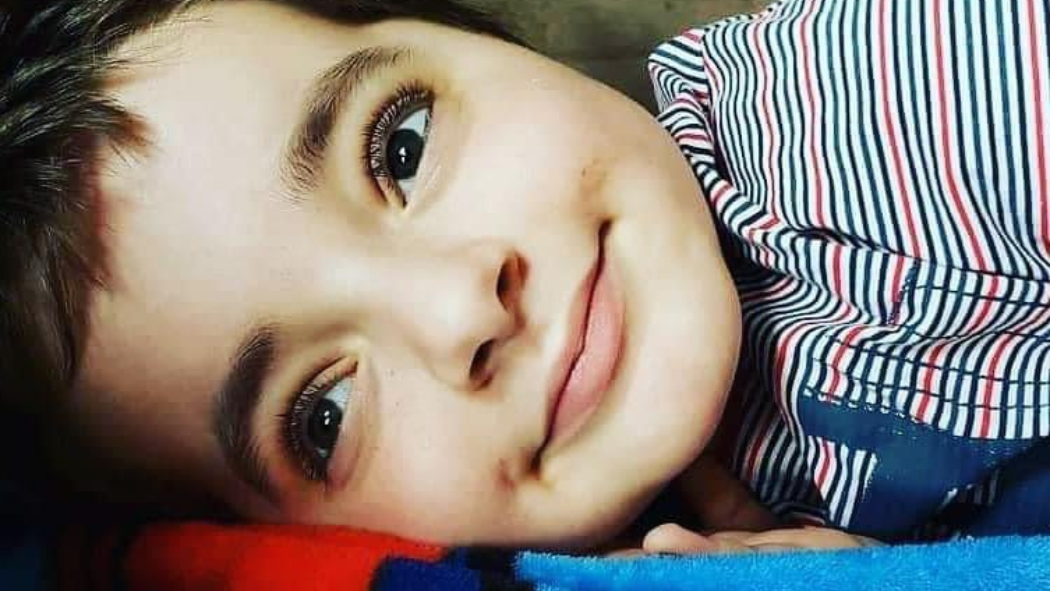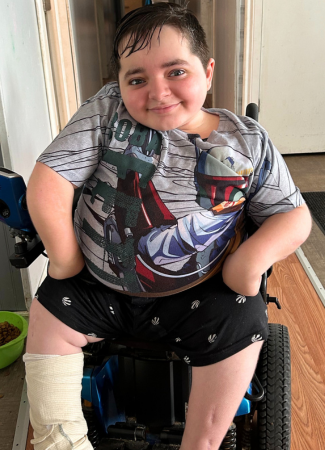
August 30, 2024
When Reiko Quinlan was born, he looked just like any other baby.
But his care team suspected something was wrong and immediately whisked him away to the Neonatal Intensive Care Unit (NICU), where monitoring in the hours following confirmed their biggest fears.
Reiko had seven fractures – some from in utero and others from birth – that required his arms and legs to be supported by splints. His body had to be placed on an egg carton and then on top of a pillow before his parents could hold him for the first time.
After undergoing a series of tests, Reiko was diagnosed with Osteogenesis Imperfecta Type III; a severe rare bone disease characterized by frequent and easily occurring fractures. It occurs most often due to a single mutation in the COL1A1 gene, which is responsible for making strong bones, and is estimated to affect around two to four people out of every 100,000.

“We were devastated by this news,” said Reiko’s mother, Jessica Quinlan. "We learned Reiko would likely be wheelchair-dependent and may never walk. His diagnosis changed the lives of our family forever.”
Reiko was unable to be held again for another two weeks because his care team was so worried about how fragile he was. Eventually, he began treatment that included medication, physiotherapy and surgery, and was referred to Shriners Hospitals for Children Canada (SHC Canada) in Montreal, Que., for the ultra-specialized care he needed. He and his parents would make the eight-hour trip there upwards of seven or eight times a year, even though it meant time away from work, school and the rest of the family.
“Reiko’s bones were so brittle that they would fracture by doing basically nothing,” said Quinlan. “He would be playing with toys or on a swing set, just like all regular kids, when he would hear a sudden ‘pop’ and be in absolute agony.”
Reiko’s condition was so serious that he had close to 300 fractures by his fourth birthday. One of his specialists, Dr. Leanne Ward, has since said he was one of the more severe cases she has ever seen.
To date, Reiko, now 14 years old, has experienced more than 1,000 fractures and undergone 16 surgeries, including spinal fusions and arm and leg roddings.
A patient at the new Shriners Rare Bone Disease Clinic at Children’s Hospital at London Health Sciences Centre (LHSC), Reiko is now receiving care closer to home. The clinic is the result of a new, first-of-its-kind affiliation agreement between Children’s Hospital and Shriners Hospitals for Children Canada that will drive improvements in care, teaching and research.

“Children’s Hospital and Shriners Hospitals for Children Canada have long worked together through informal clinical collaborations and referrals, but today we’re excited to enter into a formal affiliation agreement that will have significantly more impact,” said Nash Syed, Vice-President, Children’s Hospital and Women’s Program at LHSC. “This is an exciting opportunity to create something unique for the patients and families we serve, as well as for the staff, physicians, researchers and students vital to delivering this care.”
Since much of Reiko’s care started taking place at Children’s Hospital earlier this year, he has begun receiving a new type of IV infusion under the care of Drs. Leanne Ward and Funmbi Babalola. His parents describe it as a “miracle drug” that is slowly returning his ability to move around without a wheelchair. While Reiko may never be able to walk without it, he is regaining enough strength in his arms and legs to army crawl or bum scoot around when he wants to.
“We can’t believe that Reiko has gone from multiple fractures most weeks to only one in the four months since he started his new treatment, and that we’re able to have this treatment administered much closer to home,” said Quinlan, adding that Reiko is now almost pain-free.
He and his family now only make a 90-minute trip from Goderich to London, Ont., once or twice a month, which has made his condition significantly easier to manage.
“We’ve always felt like we have a whole team behind us at Children's Hospital and Shriners,” said Quinlan. “Both hospitals have been with us every step of the way. We’re so grateful for that and are incredibly excited for all the other children like Reiko who will get to experience the best of both worlds in their care thanks to this special new affiliation.”
The Children’s Hospital and Shriners Hospitals for Children Canada affiliation at a glance:
- Clinical care: A new highly specialized monthly clinic at Children’s Hospital, called the Shriners Rare Bone Disease Clinic, will offer treatment to children with complex bone disorders, such as osteogenesis imperfecta (brittle bone disease) and limb anomalies. This clinic will provide patients in southwestern Ontario, who in the past have had to travel hours to SHC Canada in Montreal, an opportunity to receive some of their care from a Shriners-credentialed physician at Children’s Hospital instead. While some patients and families will still have to travel to Montreal for complex surgical procedures, opening this clinic will make management of their complex disorders much easier. In addition, beginning next year, Children’s Hospital plans to work with physicians at SHC Canada to expand the program throughout Children’s Hospital’s catchment area, meaning SHC Canada physicians will provide care at regional hospitals throughout southwestern Ontario twice annually.
- Research: Beginning this fall, research teams from both hospitals will come together for a Joint Quarterly Conference to discuss ongoing research developments and future collaborative projects. In addition, a research grant will be awarded to support innovative projects involving researchers from both hospitals. The proposed projects will be required to show a potential for improving the treatment of paediatric bone disease.
- Education: Joint Quarterly Education Rounds are already underway, allowing surgical teams – including medical students, residents and fellows – to present, discuss and find solutions to complex cases. Beginning next summer, both hospitals will also offer a two-year Joint Fellowship. The fellow will gain invaluable experience in trauma care at Children’s Hospital and in specialty orthopaedic care for complex and rare bone diseases at SHC Canada.
The affiliation is funded by a $1.5 million grant over five years from Shriners Children’s, which will be administered by Children’s Health Foundation in London and the Philanthropy Office at Canada Shriners Hospital and will be divided between both hospitals to improve clinical care, research and teaching.

